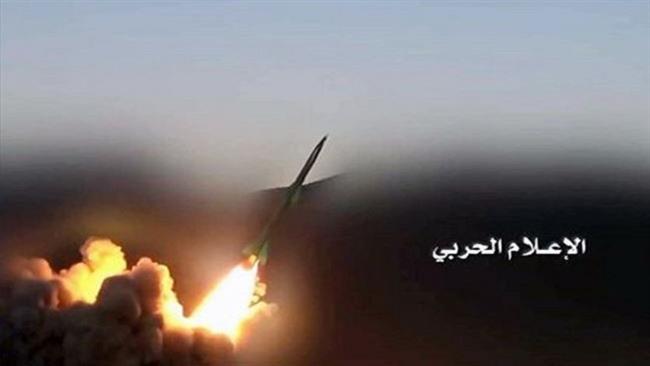Yemeni forces fire new indigenous ballistic missiles at Saudi base
Yemeni army forces and allied fighters from Popular Committees have reportedly launched three locally designed and manufactured ballistic missiles toward an area deep inside Saudi Arabia in response to the Riyadh regime’s atrocious campaign against the crisis-hit Arab country.
Yemeni soldiers and their allies fired three short-range Asif-1 (Typhoon-1) missiles toward Rajla military base in Saudi Arabia’s southwestern border region of Najran, located about 844 kilometers (524 miles) south of the capital, Riyadh, on Tuesday evening, Arabic-language Ansarollah website reported.
There were no immediate reports on casualty numbers in the attack.
On February 26, Yemeni army forces unveiled four indigenous drones to collect information on the positions and movements of militiamen loyal to resigned President Abd Rabbuh Mansur Hadi as well as Saudi troops and carry out aerial attacks against them.
The sole unveiled combat aircraft, code-named Qasef-1 (Striker-1), has a wingspan of three meters and a hull length of 2.5 meters.

The drone has a flight endurance of 120 minutes, and is capable of carrying a payload of 30 kilograms.
Earlier this year, Yemeni army forces launched a locally designed and manufactured ballistic missile toward a military base on the outskirts of Riyadh.
The media bureau of the operations command in Yemen published a series of photos of the missile shortly afterwards.

On September 2, 2016, Yemeni forces fired a Borkan-2 (Volcano-2) 1 missile against a stationary target in the Saudi city of Ta'if, located more than 700 kilometers southeast of the Saudi capital.
According to the United Nations humanitarian coordinator for Yemen, Jamie McGoldrick, the Saudi military campaign has claimed the lives of more than 10,000 Yemenis and left 40,000 others wounded. McGoldrick told reporters in Sana’a earlier this year that the figure was based on casualty counts given by health facilities and that the actual number might be higher.
Local Yemeni sources have already put the death toll from the Saudi war at over 12,000, including many women and children.
Canada’s Yukon town council at standstill over refusing oath to King Charles
Yemen's Houthi calls for jihad to protect Palestine against Israel
VIDEO | Internal rifts within Israel
Russia launches 'ICBM' for first time against Ukraine: Kiev
Scores killed as Takfiri terrorists target Shia Muslims in Pakistan
Pezeshkian to US, Europeans: You are killing women, children
VIDEO | COP29: another climate failure?
ICC issues arrest warrants for Netanyahu, Gallant for war crimes


















 This makes it easy to access the Press TV website
This makes it easy to access the Press TV website